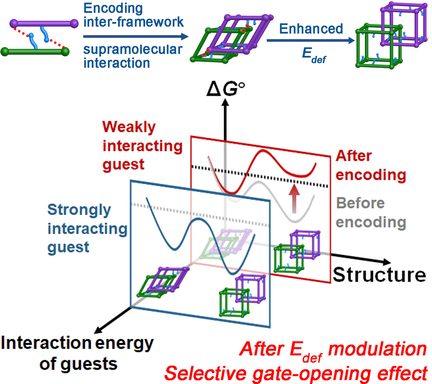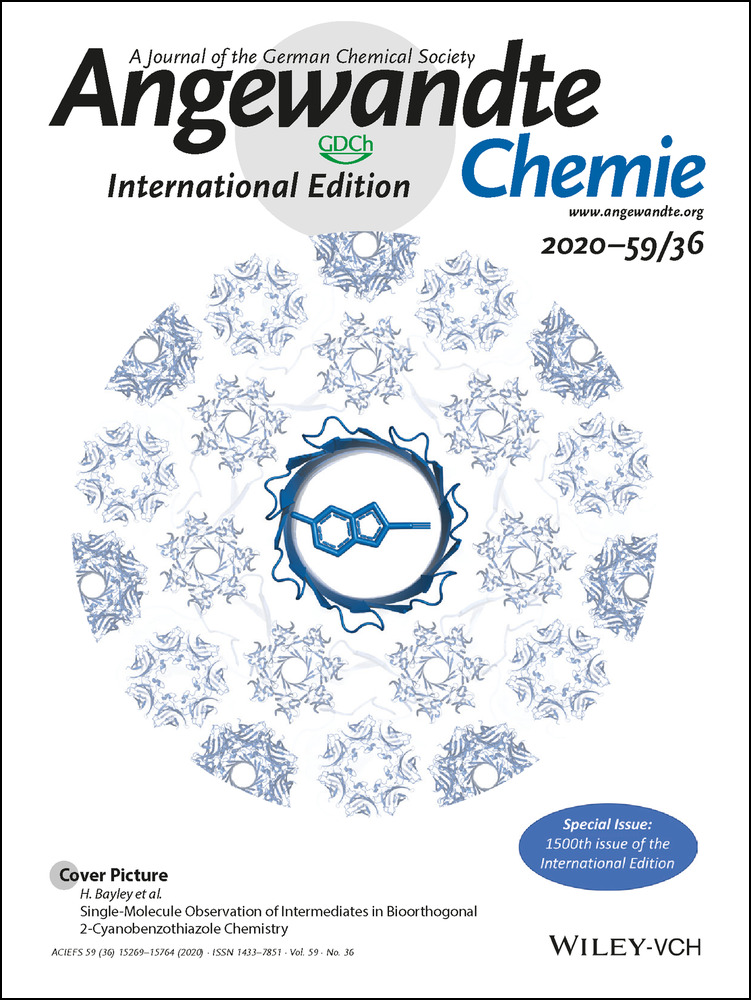Structural-Deformation-Energy-Modulation Strategy in a Soft Porous Coordination Polymer with an Interpenetrated Framework
Dr. Yifan Gu
Institute for Integrated Cell-Material Sciences, Kyoto University Institute for Advanced Study, Kyoto University, Yoshida Ushinomiya-cho, Sakyo-ku, Kyoto, 606-8501 Japan
College of Environmental Science and Engineering, Shanghai Institute of Pollution Control and Ecological Security, State Key Laboratory of Pollution Control and Resource Reuse, Tongji University, Siping Rd 1239, 200092 Shanghai, China
Search for more papers by this authorProf. Jia-Jia Zheng
Institute for Integrated Cell-Material Sciences, Kyoto University Institute for Advanced Study, Kyoto University, Yoshida Ushinomiya-cho, Sakyo-ku, Kyoto, 606-8501 Japan
Fukui Institute for Fundamental Chemistry, Kyoto University, Takano Nishihiraki-cho 34-4, Sakyo-ku, Kyoto, 606-8103 Japan
Search for more papers by this authorProf. Ken-ichi Otake
Institute for Integrated Cell-Material Sciences, Kyoto University Institute for Advanced Study, Kyoto University, Yoshida Ushinomiya-cho, Sakyo-ku, Kyoto, 606-8501 Japan
Search for more papers by this authorProf. Kunihisa Sugimoto
Institute for Integrated Cell-Material Sciences, Kyoto University Institute for Advanced Study, Kyoto University, Yoshida Ushinomiya-cho, Sakyo-ku, Kyoto, 606-8501 Japan
Search for more papers by this authorProf. Nobuhiko Hosono
Institute for Integrated Cell-Material Sciences, Kyoto University Institute for Advanced Study, Kyoto University, Yoshida Ushinomiya-cho, Sakyo-ku, Kyoto, 606-8501 Japan
Search for more papers by this authorProf. Shigeyoshi Sakaki
Fukui Institute for Fundamental Chemistry, Kyoto University, Takano Nishihiraki-cho 34-4, Sakyo-ku, Kyoto, 606-8103 Japan
Search for more papers by this authorCorresponding Author
Prof. Fengting Li
College of Environmental Science and Engineering, Shanghai Institute of Pollution Control and Ecological Security, State Key Laboratory of Pollution Control and Resource Reuse, Tongji University, Siping Rd 1239, 200092 Shanghai, China
Search for more papers by this authorCorresponding Author
Prof. Susumu Kitagawa
Institute for Integrated Cell-Material Sciences, Kyoto University Institute for Advanced Study, Kyoto University, Yoshida Ushinomiya-cho, Sakyo-ku, Kyoto, 606-8501 Japan
Search for more papers by this authorDr. Yifan Gu
Institute for Integrated Cell-Material Sciences, Kyoto University Institute for Advanced Study, Kyoto University, Yoshida Ushinomiya-cho, Sakyo-ku, Kyoto, 606-8501 Japan
College of Environmental Science and Engineering, Shanghai Institute of Pollution Control and Ecological Security, State Key Laboratory of Pollution Control and Resource Reuse, Tongji University, Siping Rd 1239, 200092 Shanghai, China
Search for more papers by this authorProf. Jia-Jia Zheng
Institute for Integrated Cell-Material Sciences, Kyoto University Institute for Advanced Study, Kyoto University, Yoshida Ushinomiya-cho, Sakyo-ku, Kyoto, 606-8501 Japan
Fukui Institute for Fundamental Chemistry, Kyoto University, Takano Nishihiraki-cho 34-4, Sakyo-ku, Kyoto, 606-8103 Japan
Search for more papers by this authorProf. Ken-ichi Otake
Institute for Integrated Cell-Material Sciences, Kyoto University Institute for Advanced Study, Kyoto University, Yoshida Ushinomiya-cho, Sakyo-ku, Kyoto, 606-8501 Japan
Search for more papers by this authorProf. Kunihisa Sugimoto
Institute for Integrated Cell-Material Sciences, Kyoto University Institute for Advanced Study, Kyoto University, Yoshida Ushinomiya-cho, Sakyo-ku, Kyoto, 606-8501 Japan
Search for more papers by this authorProf. Nobuhiko Hosono
Institute for Integrated Cell-Material Sciences, Kyoto University Institute for Advanced Study, Kyoto University, Yoshida Ushinomiya-cho, Sakyo-ku, Kyoto, 606-8501 Japan
Search for more papers by this authorProf. Shigeyoshi Sakaki
Fukui Institute for Fundamental Chemistry, Kyoto University, Takano Nishihiraki-cho 34-4, Sakyo-ku, Kyoto, 606-8103 Japan
Search for more papers by this authorCorresponding Author
Prof. Fengting Li
College of Environmental Science and Engineering, Shanghai Institute of Pollution Control and Ecological Security, State Key Laboratory of Pollution Control and Resource Reuse, Tongji University, Siping Rd 1239, 200092 Shanghai, China
Search for more papers by this authorCorresponding Author
Prof. Susumu Kitagawa
Institute for Integrated Cell-Material Sciences, Kyoto University Institute for Advanced Study, Kyoto University, Yoshida Ushinomiya-cho, Sakyo-ku, Kyoto, 606-8501 Japan
Search for more papers by this authorGraphical Abstract
Easy PCPs: The competitive relationship between the structural deformation energy (Edef) of soft PCPs and guest interactions is key for their selective guest-triggered structural-transformation behavior. The flexibility of PCPs can be well controlled by modulating Edef to change the adsorption-energy landscape of guests for precise molecular recognition.
Abstract
To achieve unique molecular-recognition patterns, a rational control of the flexibility of porous coordination polymers (PCPs) is highly sought, but it remains elusive. From a thermodynamic perspective, the competitive relationship between the structural deformation energy (Edef) of soft PCPs and the guest interaction is key for selective a guest-triggered structural-transformation behavior. Therefore, it is vital to investigate and control Edef to regulate this competition for flexibility control. Driven by these theoretical insights, we demonstrate an Edef-modulation strategy via encoding inter-framework hydrogen bonds into a soft PCP with an interpenetrated structure. As a proof of this concept, the enhanced Edef of PCP enables a selective gate-opening behavior toward CHCl3 over CH2Cl2 by changing the adsorption-energy landscape of the compounds. This study provides a new direction for the design of functional soft porous materials.
Supporting Information
As a service to our authors and readers, this journal provides supporting information supplied by the authors. Such materials are peer reviewed and may be re-organized for online delivery, but are not copy-edited or typeset. Technical support issues arising from supporting information (other than missing files) should be addressed to the authors.
| Filename | Description |
|---|---|
| anie202003186-sup-0001-misc_information.zip2.1 MB | Supplementary |
Please note: The publisher is not responsible for the content or functionality of any supporting information supplied by the authors. Any queries (other than missing content) should be directed to the corresponding author for the article.
References
- 1
- 1aS. Horike, S. Shimomura, S. Kitagawa, Nat. Chem. 2009, 1, 695–704;
- 1bA. Schneemann, V. Bon, I. Schwedler, I. Senkovska, S. Kaskel, R. A. Fischer, Chem. Soc. Rev. 2014, 43, 6062–6096;
- 1cS. K. Elsaidi, M. H. Mohamed, D. Banerjee, P. K. Thallapally, Coord. Chem. Rev. 2018, 358, 125–152;
- 1dZ. Chang, D.-H. Yang, J. Xu, T.-L. Hu, X.-H. Bu, Adv. Mater. 2015, 27, 5432–5441.
- 2
- 2aS. Henke, A. Schneemann, A. Wütscher, R. A. Fischer, J. Am. Chem. Soc. 2012, 134, 9464–9474;
- 2bH. J. Choi, M. Dinca, J. R. Long, J. Am. Chem. Soc. 2008, 130, 7848–7850;
- 2cT. Loiseau, C. Serre, C. Huguenard, G. Fink, F. Taulelle, M. Henry, T. Bataille, G. Férey, Chem. Eur. J. 2004, 10, 1373–1382;
- 2dD. N. Dybtsev, H. Chun, K. Kim, Angew. Chem. Int. Ed. 2004, 43, 5033–5036; Angew. Chem. 2004, 116, 5143–5146;
- 2eY. Zhang, X. Zhang, J. Lyu, K.-i. Otake, X. Wang, L. R. Redfern, C. D. Malliakas, Z. Li, T. Islamoglu, B. Wang, O. K. Farha, J. Am. Chem. Soc. 2018, 140, 11179–11183.
- 3
- 3aP.-Q. Liao, A.-X. Zhu, W.-X. Zhang, J.-P. Zhang, X.-M. Chen, Nat. Commun. 2015, 6, 6350;
- 3bZ. Wang, S. M. Cohen, J. Am. Chem. Soc. 2009, 131, 16675–16677.
- 4E. J. Carrington, C. A. McAnally, A. J. Fletcher, S. P. Thompson, M. Warren, L. Brammer, Nat. Chem. 2017, 9, 882.
- 5
- 5aY. Sakata, S. Furukawa, M. Kondo, K. Hirai, N. Horike, Y. Takashima, H. Uehara, N. Louvain, M. Meilikhov, T. Tsuruoka, Science 2013, 339, 193–196;
- 5bH. Miura, V. Bon, I. Senkovska, S. Ehrling, S. Watanabe, M. Ohba, S. Kaskel, Dalton Trans. 2017, 46, 14002–14011.
- 6
- 6aA. P. Katsoulidis, D. Antypov, G. F. Whitehead, E. J. Carrington, D. J. Adams, N. G. Berry, G. R. Darling, M. S. Dyer, M. J. Rosseinsky, Nature 2019, 565, 213;
- 6bS. Yang, X. Lin, W. Lewis, M. Suyetin, E. Bichoutskaia, J. E. Parker, C. C. Tang, D. R. Allan, P. J. Rizkallah, P. Hubberstey, N. R. Champness, K. Mark Thomas, A. J. Blake, M. Schröder, Nat. Mater. 2012, 11, 710–716;
- 6cW. M. Bloch, A. Burgun, C. J. Coghlan, R. Lee, M. L. Coote, C. J. Doonan, C. J. Sumby, Nat. Chem. 2014, 6, 906;
- 6dJ. H. Lee, S. Jeoung, Y. G. Chung, H. R. Moon, Coord. Chem. Rev. 2019, 389, 161–188.
- 7S. O. Odoh, C. J. Cramer, D. G. Truhlar, L. Gagliardi, Chem. Rev. 2015, 115, 6051–6111.
- 8
- 8aD. Bousquet, F.-X. Coudert, A. Boutin, J. Chem. Phys. 2012, 137, 044118;
- 8bG. Fraux, F.-X. Coudert, Chem. Commun. 2017, 53, 7211–7221;
- 8cF. Bigdeli, C. T. Lollar, A. Morsali, H.-C. Zhou, Angew. Chem. Int. Ed. 2020, 59, 4652–4669; Angew. Chem. 2020, 132, 4680–4699;
- 8dM. Shivanna, Q.-Y. Yang, A. Bajpai, E. Patyk-Kazmierczak, M. J. Zaworotko, Nat. Commun. 2018, 9, 3080.
- 9
- 9aL. Vanduyfhuys, S. Rogge, J. Wieme, S. Vandenbrande, G. Maurin, M. Waroquier, V. Van Speybroeck, Nat. Commun. 2018, 9, 204;
- 9bS. Watanabe, H. Sugiyama, H. Adachi, H. Tanaka, M. T. Miyahara, J. Chem. Phys. 2009, 130, 164707.
- 10J.-J. Zheng, S. Kusaka, R. Matsuda, S. Kitagawa, S. Sakaki, J. Am. Chem. Soc. 2018, 140, 13958–13969.
- 11B. Chen, C. Liang, J. Yang, D. S. Contreras, Y. L. Clancy, E. B. Lobkovsky, O. M. Yaghi, S. Dai, Angew. Chem. Int. Ed. 2006, 45, 1390–1393; Angew. Chem. 2006, 118, 1418–1421.
- 12B. Huang, C. Lei, C. Wei, G. Zeng, Environ. Int. 2014, 71, 118–138.
- 13C. Cuadrado-Collados, J. Fernández-Català, F. Fauth, Y. Q. Cheng, L. L. Daemen, A. J. Ramirez-Cuesta, J. Silvestre-Albero, J. Mater. Chem. A 2017, 5, 20938–20946.
- 14R. C. Bansal, M. Goyal, Activated carbon adsorption, CRC press, 2005.
10.1201/9781420028812 Google Scholar
- 15S. Ehrling, I. Senkovska, V. Bon, J. D. Evans, P. Petkov, Y. Krupskaya, V. Kataev, T. Wulf, A. Krylov, A. Vtyurin, J. Mater. Chem. A 2019, 7, 21459–21475.
- 16Y. Lin, C. Kong, L. Chen, RSC Adv. 2016, 6, 32598–32614.
- 17D. Frenkel, B. Smit, Understanding Molecular Simulation, Academic Press, San Diego, 2001.
- 18J. P. Perdew, K. Burke, M. Ernzerhof, Phys. Rev. Lett. 1996, 77, 3865–3868.
- 19S. Grimme, J. Chem. Phys. 2006, 27, 1787–1799.





